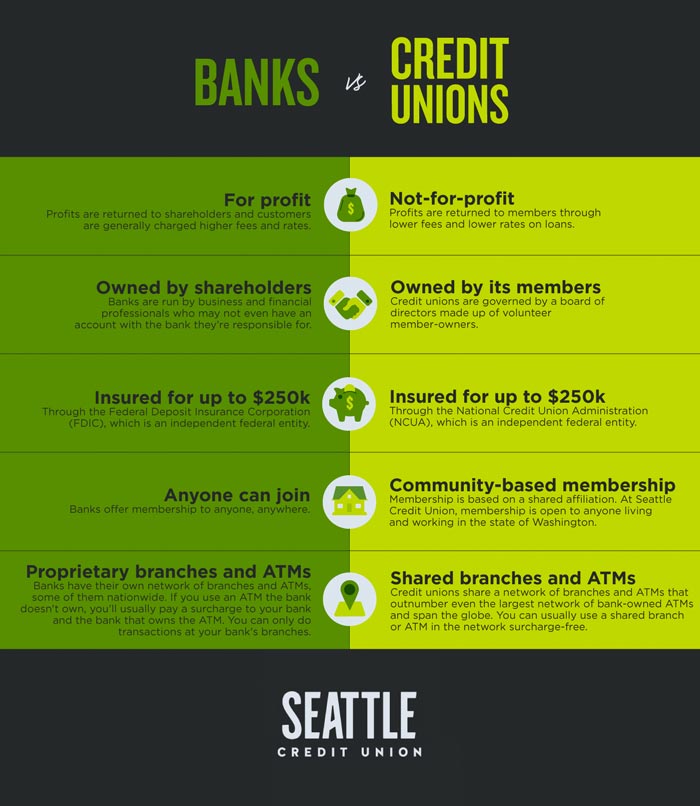Credit Union in Wyoming: Discover the Advantages of Member-Focused Financial
Credit Union in Wyoming: Discover the Advantages of Member-Focused Financial
Blog Article
The Ultimate Guide to Comprehending Cooperative Credit Union
Debt unions stand as distinct monetary entities, rooted in concepts of common assistance and member-driven procedures. As we navigate with the details of credit scores unions, an insightful journey awaits to shed light on these member-focused organizations and how they differ from standard banks.
What Are Lending Institution?
Lending institution are member-owned banks that supply an array of banking services to their members. Unlike traditional financial institutions, cooperative credit union run as not-for-profit companies, implying their main emphasis gets on offering their participants instead of optimizing revenues. Members of a credit score union typically share a common bond, such as helping the exact same company, coming from the same area, or being part of the same organization.
One of the key advantages of credit score unions is that they frequently use higher interest prices on savings accounts and lower rate of interest on financings contrasted to banks. This is because lending institution are structured to benefit their participants straight, allowing them to hand down their incomes in the form of far better rates and less costs. In addition, credit score unions are understood for their individualized client service, as they prioritize developing partnerships with their members to comprehend their distinct financial needs and objectives.
Background and Development of Credit Rating Unions

The origins of member-owned financial cooperatives, known today as cooperative credit union, trace back to a time when neighborhoods looked for choices to standard banking organizations. The principle of cooperative credit union come from the 19th century in Europe, with Friedrich Wilhelm Raiffeisen often attributed as the leader of the participating financial motion (Cheyenne Credit Unions). Raiffeisen started the first identified debt union in Germany in the mid-1800s, emphasizing area assistance and self-help concepts
The development of lending institution continued in North America, where Alphonse Desjardins developed the very first cooperative credit union in Canada in 1900. Shortly after, in 1909, the first U.S. lending institution was formed in New Hampshire by a team of Franco-American immigrants. These early credit scores unions operated the fundamental concepts of common support, autonomous control, and participant ownership.
With time, cooperative credit union have expanded in popularity worldwide due to their not-for-profit framework, concentrate on serving participants, and supplying affordable financial products and solutions. Today, cooperative credit union play an important function in the financial market, providing easily accessible and community-oriented banking choices for people and organizations alike.
Membership and Qualification Requirements
Membership at a debt union is commonly limited to individuals satisfying specific qualification standards based on the establishment's beginning principles and regulatory requirements. Some credit unions might only offer individuals that work or live in a particular location, while others might be tailored to workers of a specific business or participants of a specific organization.
In addition, cooperative credit union are structured as not-for-profit organizations, indicating that their key goal is to serve their participants as opposed to generate profits for shareholders. This emphasis on participant service frequently converts right into more tailored focus, reduced costs, and affordable rate of interest rates on financial savings and car loans accounts. By fulfilling the eligibility criteria and becoming a participant of a lending institution, people can access an array of financial product or services customized to their specific requirements.
Providers and Products Supplied
One of the crucial elements that establishes debt unions apart is the varied range of financial services and products they offer to their members. Debt unions commonly supply conventional financial services such as savings and checking accounts, car loans, and credit score cards.
In addition, cooperative credit union usually offer practical online and mobile banking options for members to conveniently manage their funds. They may use perks such as shared branching, enabling members to access their accounts at other lending institution throughout the country. Some cooperative credit union also offer insurance policy products like home, life, and vehicle insurance to help participants safeguard their properties and enjoyed ones.
Along with economic solutions, lending institution often involve in area outreach programs and economic education and learning campaigns to support their members in accomplishing their financial objectives.
Benefits of Banking With Cooperative Credit Union
When thinking about financial establishments, checking out the advantages of banking with cooperative credit union discloses one-of-a-kind benefits for members seeking individualized service and competitive prices. One substantial benefit of lending institution is their focus on tailored client service. Unlike large financial institutions, credit score unions are member-owned and prioritize structure strong partnerships with their participants. This means that credit score union staff usually have a much deeper understanding of their members' economic needs and can provide customized options to aid them attain their objectives. In addition, lending institution are known for using competitive rate of interest on financial savings and financings accounts. Since they are not-for-profit organizations, cooperative credit union can frequently give reduced loan rates, greater financial savings prices, and lower fees compared to typical banks. This can lead to significant price financial savings for members gradually. Generally, financial with a credit report union can provide a much more customized, affordable, and member-centric monetary experience.
Verdict

Credit rating unions are member-owned economic institutions that use a variety of banking solutions to their participants. The principle of debt unions originated in the 19th century in Europe, with Friedrich Wilhelm Raiffeisen frequently attributed as the leader of the cooperative financial activity.The development of credit report unions continued in North America, where Alphonse Desjardins developed the initial debt union in Canada in 1900. Credit scores unions typically supply traditional financial solutions such as financial savings and Wyoming Credit Union inspecting accounts, loans, and debt cards.When taking into consideration economic institutions, discovering the benefits of banking with credit unions reveals unique advantages for participants seeking individualized solution and competitive prices.
Report this page